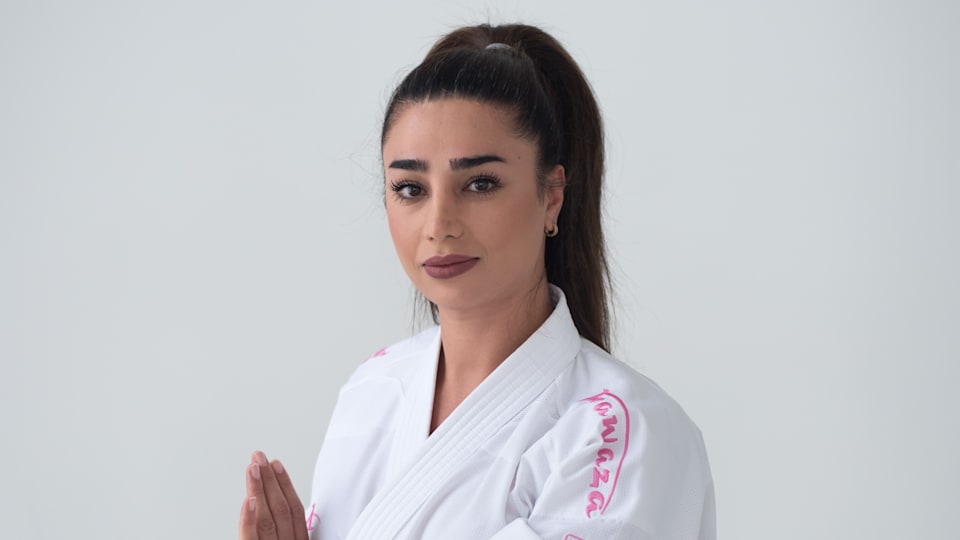Iranian karate coach Samira Malekipour: “Every girl on the planet needs to be free to achieve her dream"
Three years ago the woman left for Canada to coach her husband Hamoon Derafshipour, who represented the IOC Refugee Olympic Team at Tokyo 2020.

When Iranian karateka Hamoon Derafshipour entered the Olympic Games Tokyo 2020 as part of the IOC Refugee Olympic Team, he was the only karate competitor accompanied by a female coach.
A year earlier, he and his wife Samira Malekipour left for Canada so that Samira, the former coach of Iran’s women’s karate team, could prepare him ahead of the Tokyo Games. Existing rules in Iran did not allow her to train him.
“We wanted to give Hamoon the best chance to succeed, and I was ready to support him to make his Olympic dream come true,” Samira said.
“He wanted the freedom to choose his coach and he chose me – a woman, his wife.”
“Show them it can be done”
Great strides have been made for the Olympic Games to become the largest gender-equal sporting event in the world. And at the Olympic Games Tokyo 2020, women accounted for 48 per cent of athletes. But there is still work to be done to increase female representation among athletes’ entourages. In Tokyo, for example, only 13 per cent of coaches were women.
The IOC is committed to addressing the challenge and is encouraging the Olympic Movement to find pathways for more women to reach the highest levels of coaching. Increasing the visibility of elite coaches who have broken those barriers, and who are role models for more women to follow their lead, is itself a goal.
Malekipour, herself an elite karateka, says there should be no difference between a female and male coach.
“Coaching my husband in the Olympic Games gave me confidence to share my experience and my knowledge with athletes and other female coaches and show them it really can be done. It is not just talk.”
Persevering to overcome obstacles
Growing up in Iran, Samira’s path to become a high-profile coach was not straightforward.
She passed all the national and international coaching courses and was invited to the national team camp as a coach. “We had a difficult road ahead because women coaches did not have full freedom of action, and usually men in federations made the final decisions,” she says.
She also believes that girls and women face many more obstacles than men. The obstacles are often linked to mental barriers, lack of confidence, and – as in Samira’s case – a patriarchal culture. But despite the difficulties, Samira says, women and girls persevere to assume top positions in sport.
“There are many hard-working women in Iran who have high abilities in various sports fields, but due to the type of patriarchal culture, they are given fewer opportunities to perform. Despite this, every year we witness the brilliance of many of them in various sports competitions.”
What is crucial is the ability to keep going, she says. “If you fall a thousand times, make sure you pick yourself up a thousand and one times.”
Change needs to start at grassroot level
Coaches are visible and influential decision-makers. And it is critical for women and young girls to see female coaches, to believe that they can also take on positions of responsibility and influence. The challenge often starts at grassroots level, and things will take time to improve.
A coaching career typically takes 10 to 12 years of competition at national level before reaching the Olympic level. Or, put another way: it often takes more time to become an elite level coach than to become an elite athlete.
“Every girl on the planet needs to be free to achieve her dream,” says Samira.
To make her dream come true, Samira sacrificed a lot. “I miss my family, friends and country, but when I was there at the Tokyo Games, I felt so incredibly proud.
“If girls see me doing what I do and decide they can also go for it, then that is all I hope for.”
Apart from supporting girls to become coaches, Samira is also engaged in helping young refugees in Canada to develop as athletes and coaches.
“Refugees have such a painful story, and I believe that sport has healing powers,” she says. “That’s why I will do everything to help these young people to overcome their pain through sport.”
